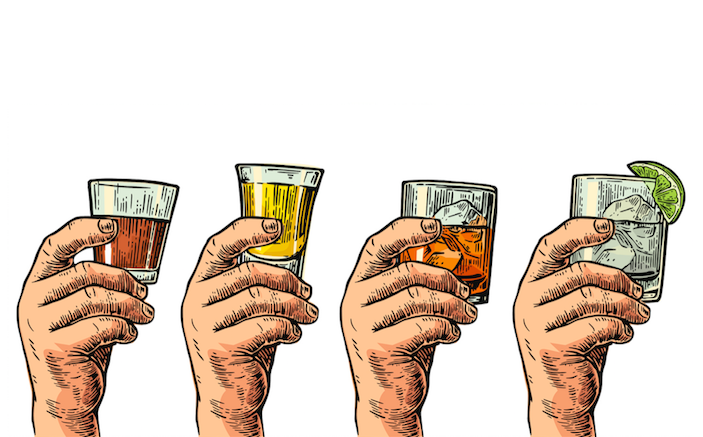A recent literary dive into the history of gin taught me an unexpected lesson: Emergency Physicians need to drop their moral superiority and show grace to all comers.
Whatever became of gentlemen? That person (man or woman) who could connect and comment learnedly on a variety of subjects. Who treated wait staff with respect and actually had genuine regard for other people. Those individuals who could participate in active, genuine listening and leave you feeling appreciated if not vindicated and wished you well and actually meant it when they said it. Such people are a rare breed today.
I am openly revulsed by the decline in the proper handshake. Throughout my entire career I shook hands with virtually every patient. I am not one of those physicians who believe we spread disease with a simple handshake in most cases. What we actually spread is some civil decency and I hate the fact that it is going away. I am a straight-out handshake guy and a handshake guy I intend to remain.
I think you should stand up when someone new comes to the table, be it a man or a woman, until properly released from such obligations (“Please, don’t get up”). I believe in having mostly leather shoes and I cure and polish them with love and respect.
Baseball caps are fine in their place but not at the dinner table or at dress events. Nothing turned my stomach quite like seeing Bernie Madoff being perp walked in a Ferragamo suit and a ragged New York Yankees cap. Have you no shame, Bernie? And don’t get me started on unsportsmanlike touchdown dances, which are only rivaled by the Tarzan screams of the slam dunk.
Real winners are those people who have known pain and have felt and understood the depression of defeat. A real champion knows the best man does not always win. Therefore, he is magnanimous in victory and resolute in defeat. Gracious winning is the mark of that person who we used to call a sportsman.
Where am I going with this? Straight back to the emergency department. In the halcyon days of early emergency medicine, I needed to hire various residents to work part-time in the pits with me. You could not tell by their paperwork who would be a winner or a loser with the patients. You couldn’t tell by their specialty either. Three of the best residents I ever had the pleasure of working with were a general surgeon, a thoracic surgeon and an orthopedic resident – go figure. They were kind to a fault and always professional. They were what you would want your child to be when they grew up. I would have gone to any one of them for healthcare, based entirely on the way they treated humans. They were all brilliant people, great technical doctors who did not let their mechanical and academic skills and successes get in their way of being genuinely good people.
But I had plenty of the other types, those Joseph Epstein called “solipsistic bores” who suffered, more likely enjoyed, the Copernican complex – they believed that the medical solar system revolved around them. In one way, they were lucky fellows, because self-love never goes unrequited. Every residency class has a loser, a problem child, and an ego maniac. I have never met a residency director who didn’t say: “How did I let that person get picked?” or “What didn’t I see?” I think we are asking the wrong people to evaluate them. We’d be better off if we were given the names of ten of their previous patients, pulled at random, and asked them what they thought. It’s just an idea.
*****
What does it mean to be a gentleman in emergency medicine? I’d like to suggest that it starts when we stop inflicting our moral superiority on others. This often manifests itself in our ability to torture, lecture and insult uninterested sinners. Which is like trying to teach a pig how to sing; it frustrates you and it angers the pig and there’s never a good outcome (when faced with teaching pigs how to sing, avoid grand opera, lest you cast your pearls before swine).
This lesson came to me while reading David Broom’s new book, Gin: The Manual. It’s exactly what it says it is, which is a work describing the transcendent rise of designer gins across the world.
Until recently, gin was a drink that Lord Nelson said was “to pacify whores and invalids.” More correctly, what it had become is a drink for the aging bourgeoisie country club sets at provincial hotels and other cocktail events, where little thought was given to the quality as opposed to the quantity of the liquid. For those with a historical bent, the English took up adding tonic (malarial prevention) and lime (scurvy prevention) following their long posting to India.
Walking into upscale bars in London and New York where the hipsters and the cognisanté hang out, you are assaulted by the choice of gin-makers. What gin do you prefer? God forbid you request something unknown “from the well.” Better you end your sentences on prepositions than not know your gins. (If in doubt, order Hendrick’s.)
In his book, Broom gives us philosophy as well as liquid wisdom. He quotes Hester Thrale, who did us all the great favor of writing anecdotes of the late Samuel Johnson. Johnson, a doctor, writer, bon vivant and raconteur, did more than give Boswell employment. His Dictionary of the English Language is the reason, along with King James and Shakespeare, we speak the way we do.
Ms. Thrale recalled how some do-gooders and busybodies had confronted Johnson and objected to the fact that he gave money to beggars who would be sure to spend the money on gin. Johnson put his finger on the truth: “And why should they be denied such sweeteners of existence? It is surely very savage to refuse them every possible avenue to be pleased and to reckon with the course of their acceptance. Life is a pill, which none of us can bear to swallow without gilding.”
What you drink says much more about you than the fact that you do drink. I personally am a Four Roses teetotaler; not a drop. I am not, however, a Louis XIII teetotaler. Bring it on. Expensive wine carries with it its own kind of view of a person. It is the sun-soaked California in La Jolla. It is the suave Mediterranean optimist. Just pick your group.
These types are socially acceptable to us. People who sit in corners and drink wine in a paper bag are not. Why do we think that our sin is less than their sin? I daresay there may be more than a few libations consumed at the 2016 ACEP meeting this month in Vegas. Residents, by both custom and externally imposed cost containment, are allowed to consume both Mad Dog 2020 and Boon’s Farm without harsh judgment from their elders. Boys will be boys.
The point is this: Lecturing, berating or belittling intoxicated patients is never useful. You don’t actually fix anyone until they’re ready to fix themselves. My cousin, who is a Captain in the Salvation Army understands this better than most. He never begs them on this issue. He does make them attend a church service if they wish to be fed at said church. All sins have their wages.
The Scriptures tell us that “wine maketh glad the heart of man.” My observation has been that this goes for women as well on a milligram per kilogram basis. Broom reminds us that gin is not a drink invented for just pleasure and gladness. He recognizes the lacrimae rerum and knows that the use of alcohol, whether it is in moderation or not, has a metaphysical dimension. It can both sweeten life’s pills and destroy the soul. It is the serpent in our own Garden of Eden. Liquor does not make the reflective person sad. It makes us realize the sadness of things around us. It sharpens what is already our overly repressed experience. No doubt there are those of you who have conquered this human nature. And to those of you who live like Buddhist monks and can live without it, my hat is off to you. But to the rest of us, it is good to remember that: “There but for the grace go I.”
Driving home a few days ago, a homeless man holding a cardboard sign comes up to my car window and begs for some cash. (I am certain that this is like Bertolt Brecht’s The Threepenny Opera and they rent both the costume and the location from some guy in a garret room.) He says straight out that he is not going to lie to me. He wants the money to buy a 40-ouncer, so he can go to sleep. No crap about being a veteran. No bullshit about wanting to work. Just straight out what he wants. I remember the thoughts of Samuel Johnson and I gave him two bucks.
Cheers.






1 Comment
I’m looking forward to your editorial compilation. What’s the expected release date?